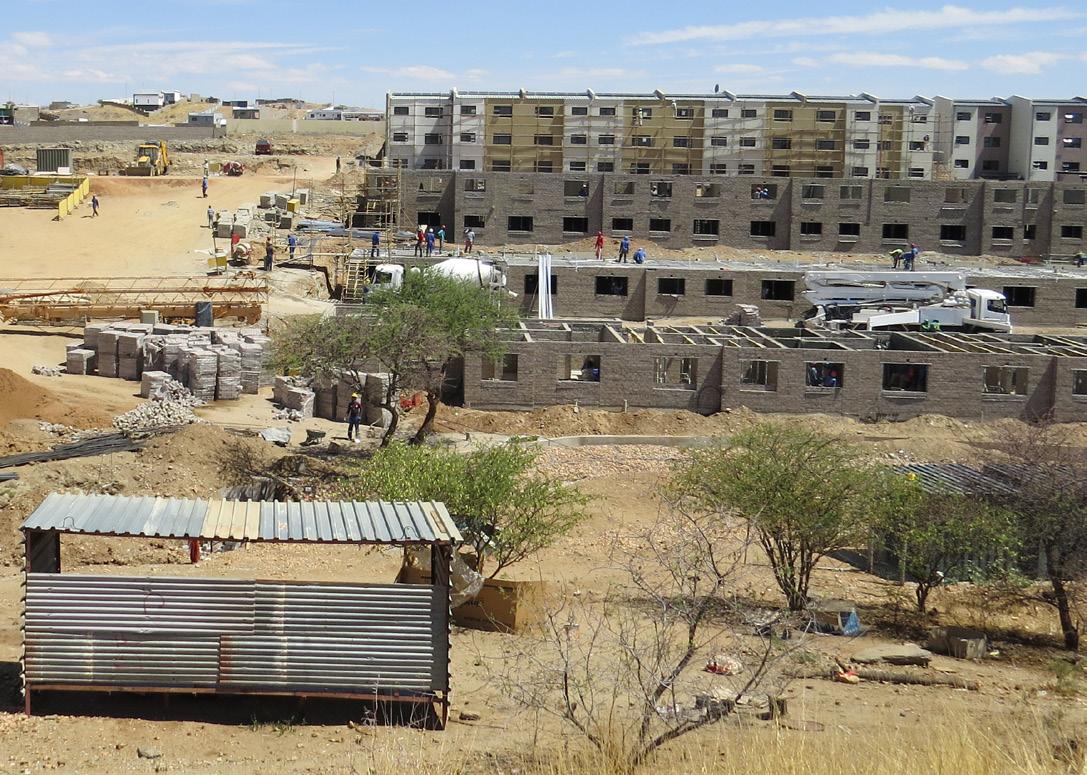
5 minute read
The basic in acquiring residential plot in urban area
The Basics of Acquiring a Residential Plot in an Urban Area
Given the 300 000-housing backlog in the country, which requires about N$76 billion, urban dwellers are getting frustrated on whether they will ever own a residential plot or house in town. The Construction and Mining magazine has spoken with various experts to reveal the channels on how ordinary Namibians can acquire land (plot or house), in urban areas.
Advertisement
The industry players indicated that acquiring decent residential land (plot and house) in various towns of Namibia takes different channels/methods and depends on the town you are living in.
Servicing of land plays a role in its acquisition; first land serviced by a municipality; secondly is a plot serviced by a developer, and finally a plot serviced through a partnership between the municipality and developer.
Land which is serviced by the municipality through budgetary allocation can be acquired by the locals more affordably, the experts indicated that it is because in most cases the pricing is not done on cost recovery and can be politically influenced.
This type of land is acquired through the municipality’s advertisements and residents or anybody who submits their bids or can be sold to those who applied via the municipality.
With this method of acquisition, people build with their time and in most cases no mortgage is involved as people build off their pockets. However, with fiscal consolidation (reduced public expenditure) back in the 2015-16, few funds were availed to the municipalities to service land and provide bulk services on virgin land.
When a developer buys virgin land from the local authority, service it and sells the plots to the public, resident can acquire it by purchasing property/land from the developer who builds top structures that individuals can buy. With this approach, the developer prices the residential plot or top structure on cost recovery and their profit margin. However, this approach was changed because more foreigners found a way to buy land in Namibia and prices went skyrocketing.
The third option to get a residential plot, which is kind of a hybrid is through a public-private partnership (PPP) serviced land. In this model, the municipality partners up with a private developer and avail land to be serviced with option to build top structures. The land does not get owned by the developer to avoid speculation -no title deeds given to the developer, they are just administrators. Individuals who want a plot or house buy it from the municipality through the administration of the developer.
Individuals who want a plot or house thus apply to the municipality and their names get to be submitted to the ministry (urban and rural) for approval to avoid an individual owning multiple properties for speculations and pushing up residential plots and house prices.
The city of Windhoek spokesperson Lydia Amutenya added that it also depends on the zoning of the property. She explained that for the city’s, single residential erven are sold on tender (closed bid method), and private treaty to those on the city waiting list. “We only sell single residential erven on private treaty to clients in lower
income areas registered to the City of Windhoek waiting list. She added that, if the land is privately owned, the only legal requirement is to get the necessary building plan approvals in terms of City of Windhoek Building Regulations.
While for City owns land and where it is under the CoW housing project, the process involves procuring services of construction contractors but is also subjected to the necessary Building Regulations Approvals. To register a house or plot in Windhoek- once you have been allocated the land and paid it in full the registration process is done through a conveyancing attorney.
THE SHACK DWELLER’S WAY
Apart from the conventional way of land acquisition, the Shack Dwellers Federation of Namibia (SDFN) also offer a channel for one to own a residential plot or house.
According to Heinrich Amushila, Co-Director of Namibia Housing Action Group; one has to be a member of the saving group within a specific town for them to benefit from plots under the SDFN. He said low income people organise themselves in saving groups with minimum members of 10 and maximum 30. “They start saving within the groups. To qualify, they must save 5% of the loan amount needed, and participate in the activities of the group,” said Amushila.

No cash is paid to the home-owner but to building material suppliers and builders labour’which is paid to the saving group who pay the builders. Construction is managed by the building team - 3-4 members tasked by the group and monitoring is done to make sure houses are completed within a short period. In the past, construction time was three months but now reduced to two months. Houses not completed within that time frame succumbs to a penalty of N$ 1000-00 charged per month. Finally, the overall cost of the SDFN houses range between N$ 35 000 to 60 000 for a 34m/2 house. The Informal Settlement Upgrading Pilot Project is a joint initiative between the Ministry of Urban and Rural Development, City of Windhoek, the National Housing Enterprise, and the Khomas regional council, which targets to construct 1,200 affordable brick houses over two years in Windhoek’s informal settlements. The project forms part of the country’s national development agenda under the Harambee Prosperity Plan and seeks to address the 84,000 housing backlog in Windhoek

HOUSING OPTIONS
1. BASIC SHELTER (Open Plan, Kitchen, Full Bathroom, Bedroom - (22M2) 2. 1 BEDROOM Open Plan, Kitchen, Full Bathroom, Bedroom- (35M2) 3. 2 BEDROOMS Open Plan Kitchen, Full Bathroom, 2 Bedrooms – (45M2)
Document Required
• Proof of ownership of erf (Title Deed, Deed of Sale, Lease Agreement, Municipal Account) • Certified copies of Identity documents of applicant and spouse (if applicable) • Marriage certificate (if applicable) • Latest pay slip/s or proof of income or declaration of income from the police • Postal address and contact number
Affordable Price ranging from N$91,464.00 to N$166.906.00 From N$774.47 to N$1,273.81 per month For 25 years (insurance inclusive) excluding transfer cost Instalment amount@ 5% interest rate for 25 years
See back cover for full project information and contact details











